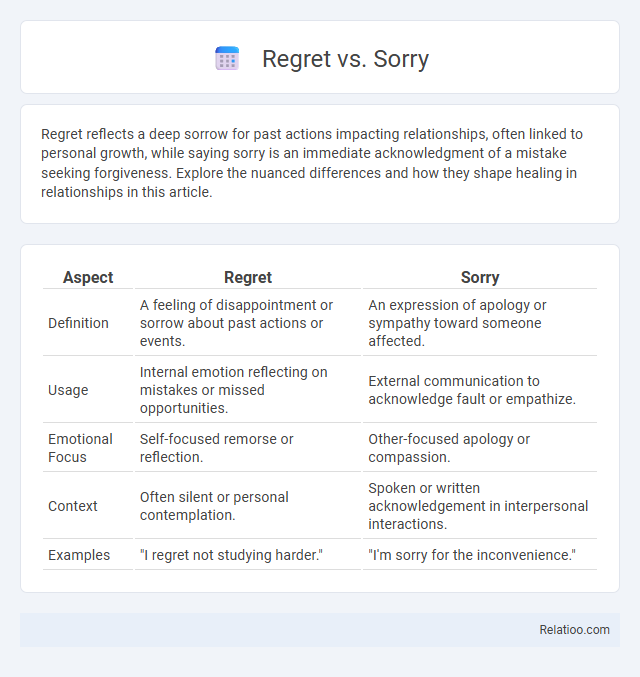Regret reflects a deep sorrow for past actions impacting relationships, often linked to personal growth, while saying sorry is an immediate acknowledgment of a mistake seeking forgiveness. Explore the nuanced differences and how they shape healing in relationships in this article.
Table of Comparison
| Aspect | Regret | Sorry |
|---|---|---|
| Definition | A feeling of disappointment or sorrow about past actions or events. | An expression of apology or sympathy toward someone affected. |
| Usage | Internal emotion reflecting on mistakes or missed opportunities. | External communication to acknowledge fault or empathize. |
| Emotional Focus | Self-focused remorse or reflection. | Other-focused apology or compassion. |
| Context | Often silent or personal contemplation. | Spoken or written acknowledgement in interpersonal interactions. |
| Examples | "I regret not studying harder." | "I'm sorry for the inconvenience." |
Understanding Regret vs Sorry: Key Differences
Regret involves a deep emotional response to past actions or decisions, reflecting a sense of loss or disappointment, while sorry is a straightforward apology expressing remorse or sympathy for a specific action or event. Understanding regret vs sorry helps you communicate more authentically by recognizing regret as a personal feeling and sorry as an acknowledgment aimed at others. Regret often implies contemplation and learning, whereas saying sorry is more immediate and social in nature.
The Emotional Roots of Regret
Regret stems from reflecting on past decisions that led to undesirable outcomes, often tied to a deep emotional sense of loss or missed opportunity. Unlike simply saying sorry, which expresses acknowledgment of a mistake or wrongdoing, regret involves a more complex emotional response that includes sorrow and self-reproach. Understanding the emotional roots of regret can help you process feelings of disappointment and guide future decision-making to avoid similar pain.
What Does ‘Sorry’ Really Mean?
Sorry expresses an apology acknowledging a mistake or hurt caused to someone else, often carrying an emotional tone of empathy and responsibility. Unlike regret, which reflects personal feelings of sadness or disappointment about an outcome, sorry directly addresses the impact on another person and aims to mend relationships. Understanding the distinction clarifies communication by highlighting the intent behind sorry as an interpersonal gesture rather than just an internal feeling.
Regret vs Sorry in Everyday Communication
Regret expresses a deep feeling of sorrow or guilt for a past action or decision, often reflecting on its consequences, while sorry is a more immediate, polite expression of apology used in everyday communication to acknowledge a mistake or inconvenience. Regret involves an emotional and reflective state, indicating a lasting impression of remorse, whereas sorry functions as a social tool to maintain politeness and empathy in interactions. Understanding the distinction helps clarify intentions and emotional depth in conversations, enhancing interpersonal communication effectiveness.
Psychological Effects of Regret and Sorry
Regret involves a deep emotional response linked to reflecting on past decisions that often results in feelings of sadness or disappointment, influencing future decision-making and personal growth. Saying "sorry" primarily aims to acknowledge responsibility and repair social bonds, which can reduce interpersonal tension but does not always address internal emotional turmoil associated with regret. Psychological effects of regret tend to be more intense and prolonged, potentially leading to rumination and decreased well-being, whereas apologies can facilitate forgiveness and emotional relief within relationships.
How Regret Influences Personal Growth
Regret influences personal growth by prompting deep self-reflection, helping you identify past mistakes and learn valuable lessons for future decisions. Unlike simply saying sorry, which addresses immediate social or emotional consequences, regret involves a more profound emotional processing that drives behavioral change and resilience. This ongoing awareness fosters maturity and an improved ability to navigate complex life situations.
The Role of Apology: When to Use Sorry
The role of apology centers on expressing remorse, with "sorry" specifically used to acknowledge a mistake or hurt caused to someone else, making it essential for personal accountability and repairing relationships. Unlike regret, which reflects an internal feeling of disappointment over an outcome, saying "sorry" directly addresses the other party's feelings and demonstrates your willingness to make amends. Understanding when to say "sorry" helps clarify your communication and fosters empathy by showing you recognize the impact of your actions.
Regret vs Sorry in Relationships
Regret and sorry convey different emotional responses in relationships; regret reflects a deeper acknowledgment of harm caused and a desire to make amends, while sorry is often a more immediate expression of apology. Your ability to express genuine regret can rebuild trust and demonstrate accountability, showing that you understand the impact of your actions beyond just feeling sorry. Understanding this distinction helps nurture healthier communication and stronger emotional connections in your relationships.
Cultural Perspectives on Regret and Sorry
Expressions of regret and sorry vary significantly across cultures, affecting interpersonal communication and emotional expression. In some cultures, saying "sorry" is a routine social norm to maintain harmony, while in others, it conveys a deep sense of personal accountability and remorse. Understanding these cultural nuances helps you navigate social interactions sensitively, recognizing when "regret" implies internal reflection versus a formal apology through "sorry.
Moving Forward: Overcoming Regret and Embracing Apology
Overcoming regret involves acknowledging past mistakes without being paralyzed by them, while embracing apology requires sincere expression and taking responsibility to mend relationships. Moving forward includes transforming regret into actionable lessons and offering genuine apologies that foster healing and personal growth. This process empowers emotional resilience and builds trust through accountability and empathy.

Infographic: Regret vs Sorry
 relatioo.com
relatioo.com